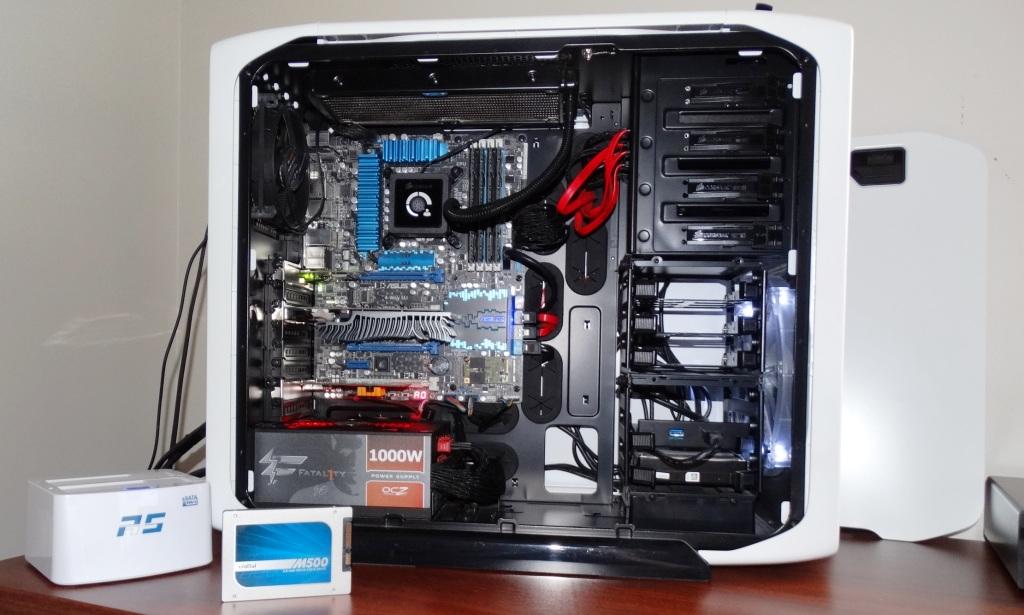TEST BENCH AND PROTOCOL
Our analysis today will be conducted with our Asus Z77 Premium Test Bench. Clicking on any pictures or benchmarks will bring up a more easily viewable high resolution image.
In testing, our main objective is to obtain results as pure and as accurate as possible and we want to ensure that no anomalies slip through. Simply put, we want to provide you with the absolute best results the tested hardware can provide. Repetition in testing is standard and, if necessary, we may conduct specific tests in Windows 7 ‘safe mode’ to ensure the OS has little to no influence on the end result.
In order to validate and confirm our findings, testing is supported by industry accepted benchmark programs. All results are displayed through capture of the actual benchmark for better understanding of the testing process by the reader.
We would like to thank ASUS (P8Z77-V Premium![]()
![]() ), Intel (Core i7-3770K
), Intel (Core i7-3770K![]() ), Crucial (Ballistix
), Crucial (Ballistix![]() ), Corsair (H100
), Corsair (H100![]() ) and Be Quiet (PSU/Fans) for supporting the build of our Z77 Premium Test Bench. In addition, we would also like to thank HighPoint for their contribution of the RocketStor 5322
) and Be Quiet (PSU/Fans) for supporting the build of our Z77 Premium Test Bench. In addition, we would also like to thank HighPoint for their contribution of the RocketStor 5322![]()
, RocketRAID 2711![]() and their External Mini-SAS to Esata cabling
and their External Mini-SAS to Esata cabling![]() . Through this configuration we are able to benchmark all notebook and mSATA SSDs, whereby achieving identical performance as a direct system connection, yet we simply hot swap from the external storage dock.
. Through this configuration we are able to benchmark all notebook and mSATA SSDs, whereby achieving identical performance as a direct system connection, yet we simply hot swap from the external storage dock.
BENCHMARK SOFTWARE
The software we will be using for today’s analysis is typical of many of our reviews and consists of ATTO Disk Benchmark, Crystal DiskMark, AS SSD, Anvil Storage Utilities and PCMark Vantage. We rely on these as they each have a way of supporting one another yet, at the same time, adding a new performance benchmark to the total picture. Much of the software is free and can be downloaded simply by clicking on the linked title.
Crystal Disk Info provides excellent information about the SSD itself to include its health, product information, power on information as well as the characteristics of the SSD.
This CDI result is very interesting, and not only because it confirms the capacity of 960GB or that TRIM works. Unlike many other consumer SSDs we have tested to date, APM is an enabled feature solely because of the M500 power loss data protection we spoke of earlier.
 The SSD Review The Worlds Dedicated SSD Education and Review Resource |
The SSD Review The Worlds Dedicated SSD Education and Review Resource | 


They are in Stock and 570.00 on Amazon. No forum link for this drive
Crucial M500 960GB SATA
2.5-Inch 7mm (with 9.5mm adapter) Internal Solid State Drive
CT960M500SSD1
20nm nand and 25 nm nand is very hard to find which I find puzzling because Crucial makes their own nand. Hence this 960gb Crucial is not available at its 599.00 price anymore. Its out of stock at most vendors and as soon as its in stock its sold out in 5 minutes.
This is one heck of a drive! I want one.
Hey David my old friend. Good to see you jump in as always…been a few years hasnt it…
Nice performance for the price! Not so high end but can’t complain.
The performanc on this drive is rather unique. On one hand we can see where the Samsung and OCZ better it in areas such as IOPS and incompressible data performance but, on the other hand, it seemed to stand up to both in such things as the AS SSD and Anvil Total Scores and blew both away in Vantage Total Point Scoring.
Right as always Les. Well i consider the low 4k read the most important factor for ssd perf because it’s the only value that you can’t improve by RAID. Actually you might decrease it a bit. Drives with strong perf should be >35mb/s in 4k like m5pro or 840pro. I may be wrong though and feel free to correct me.
The drive has support for both TCG Opal 2.0 and IEEE 1667 specifications. Having the
Opal 2.0 support means that you can utilize third-party encryption to
make the system more secure. It also provides full
compatibility with BitLocker encryption built into Windows 8. This is the
first SSD with explicit support for this feature. It also support’s Device Sleep (DEVSLP), a new standard which consumes less power between state changes, enabling fast exit latency and a more efficient energy profile. I have been reading the SSD review for many months now and really enjoy the articles and respect the attention to detail and repetition utilized during the testing procedures. Excellent work gentlemen.
Thanks Mark!!! Always looking for new site contributors and your background is solid!
Is it possible to show Host Read/Write-values with CDI?